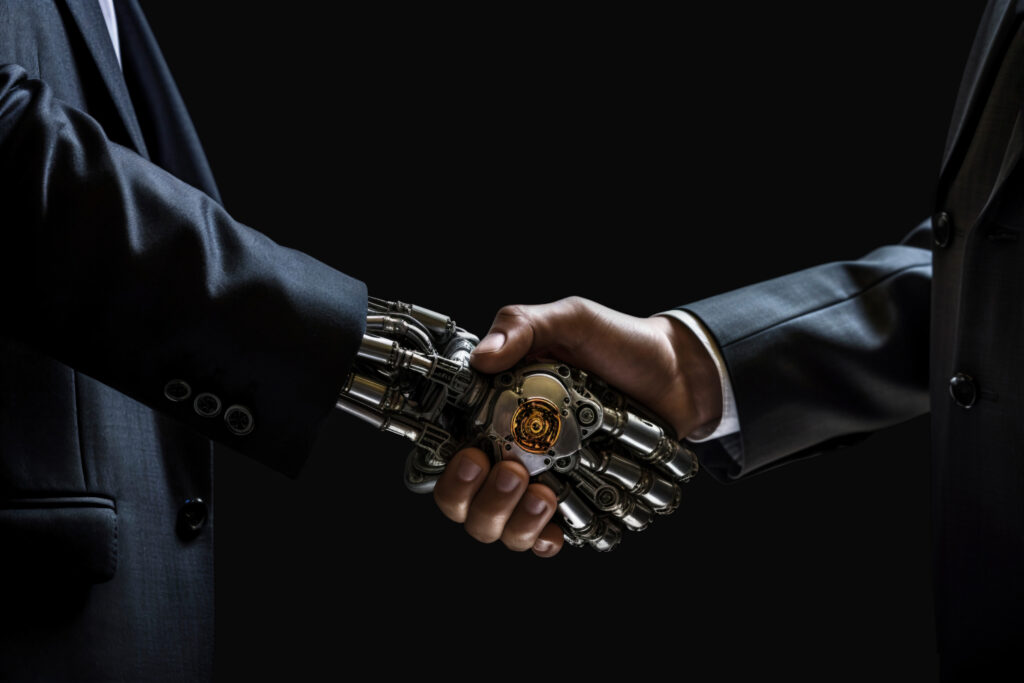The legal system in India experiences a revolutionary transition because Artificial Intelligence (AI) becomes a part of its operations. AI technology improves judicial performance while reducing court system delays and increasing reasonable judgment as well as decreased errors within judicial documentation. This article discusses the Advancements in AI and the Legal System as well as documentation, case management activities and justice delivery in India.
The Role of AI in the Legal System
AI performs a major part in transforming current legal operating systems. Advancements in AI and the Legal System has started transforming five core areas in the following manner:
Legal Research and Analysis
- Legal research tools that integrate artificial intelligence processes complete massive legal data analyses during short times to deliver appropriate case law findings and legal interpretation documents and prior legal decisions.
- Artificial intelligence systems apply machine learning technologies to judge decisions for developing case predictions which lawyers can benefit from throughout their practice.
- By using Natural Language Processing the process of retrieving legal documents becomes more efficient.
Automated Legal Documentation
- Automated document creation tools managed by AI support the development of contracts and legal notices and petitions and both eliminate human mistakes while shortening the process.
- Using predefined templates with AI allows programmers to automatically create legal documents for particular case needs.
- Through blockchain technology and AI smart contracts enable automatic legal agreement execution through predefined criteria.
AI in Case Management
- AI systems for case management allow users to track cases better through scheduling and document organization and case tracking capabilities.
- Such systems determine which cases need immediate attention in order to stop the judicial system from experiencing unnecessary delays.
- Legal clients along with lawyers receive immediate procedural and case status information through virtual assistant and AI chatbot services.
Predictive Analytics in Legal Decision-Making
- The foretelling capabilities of predictive analysis based on AI help both judges and lawyers to base their choices on statistical data.
- Selected case data from the past enables investigators to calculate the chances that a case will succeed when brought to court.
- Artificial intelligence examines past cases for its role in making sentencing and bail determination decisions.
AI-Powered Legal Chatbots and Virtual Assistants
- AI chatbots offer immediate legal advice which draws its knowledge from defined legal principles as well as case laws.
- The AI-powered systems assist people through the process of rights understanding and complaint dispatching and legal information retrieval without law firm involvement.
- Virtual legal assistants are becoming popular in law offices for administrative duties as well as call management.
E-Courts and AI-Driven Judicial Reforms
- The Indian judicial system interacts with e-Courts technology that utilizes AI for managing both digital case submissions and virtual court hearings.
- Artificial intelligence (AI)-based transcription services reduce the amount of time required to convert court discussions into written documents by streamlining human documentation procedures.
- In place of traditional litigation procedures, the technology helps identify instances that are appropriate for mediation settlement and unjustified lawsuits.
Case Study: AI Implementation in the Supreme Court of India
Through SUPACE (Supreme Court Portal for Assistance in Court Efficiency) the Supreme Court of India integrates AI as a tool to enhance its judicial processes. SUPACE represents an Advancements in AI and the Legal System which received its launch in 2021 so judges can perform better legal research and case analysis.
Key Features of SUPACE:
- The document retrieval system uses AI for judges to obtain important precedents and case laws.
- The tool shortens review time by generating shortened versions of extensive case documents.
- Real-time legal insights and recommendations for better decision-making.
Impact of SUPACE:
- Judges shorten their judgment times because SUPACE enables them to process substantial legal data faster.
- The combination of AI technology tools achieves two benefits by decreasing human mistakes and maintaining uniformity in legal evaluation processes.
- Industry professionals who need access to the law obtain valuable prepared case material from Artificial Intelligence-based platforms.
Other Indian courts maintain interest in AI-based solutions for process improvements after validating the effectiveness of SUPACE.
Challenges of Advancements in AI and the Legal System
When implementing AI, the legal sector faces several challenges even though it gains advantages from the technology:
- In the legal sector, AI apps manage case administration and legal research, therefore strong cybersecurity measures are needed to protect private client information.
- The use of AI models tends to carry biases in decision-making caused by historical legal data which creates ethical concerns.
- Law professionals resist implementing AI-powered systems because they lack both awareness and technical understanding of such technologies.
- The development of legal norms regulating AI remains under development since government institutions need explicit guidelines for AI ethical operations.
The Future of Advancements in AI and the Legal System
AI holds a bright outlook for the legal sector of India. The judicial system and government continue to support AI innovations which boost court operations and decrease court backlog through AI-driven systems. Future trends will direct the path of development through the following three developments:
- Legal assistance will become accessible through AI-powered online portals available to persons without legal representation due to financial constraints.
- Secure legal transactions will become possible through blockchain integration by using smart contracts together with AI-driven blockchain solutions.
- AI systems will use progressive sentiment analysis tools to study court-based arguments together with judicial opinions which leads to better understanding of case outcomes.
- Decision-making frameworks in alternative dispute resolution mechanisms will use AI technology as a primary component in their operations.
Conclusion
Advancements in AI and the Legal System is transforming the legal industry of India by developing research capabilities while minimizing documentative inefficiencies and managing court proceedings and advancing judicial advancements. SUPACE and other AI tools that the Supreme Court utilizes demonstrate how artificial intelligence benefits practical legal system operations. Consistent financial support and suitable regulatory guidelines will establish the conditions necessary for the ethical integration of AI technology into the legal system. The legal industry’s adoption of AI-powered technologies holds potential for speeding up judicial processes without sacrificing accuracy and expanding access to justice for all.
FAQs for Advancements in AI and the Legal System
- How is AI being used in the Indian legal system?
AI is used for legal research, document automation, case management, predictive analytics, and e-court systems to enhance efficiency and accuracy.
- What is SUPACE in the Supreme Court of India?
SUPACE (Supreme Court Portal for Assistance in Court Efficiency) is an AI-driven tool that helps judges with legal research, case analysis, and document retrieval.
- Can AI replace lawyers and judges?
No, AI cannot replace lawyers or judges but can assist them by automating repetitive tasks, improving research accuracy, and aiding decision-making.
- What are the challenges of AI adoption in law?
Challenges include data privacy concerns, AI bias, resistance from traditional legal professionals, and the need for regulatory frameworks.
- What is the future of AI in the legal sector?




Pingback: Freelance Worker Rights in 2025: Laws You Need to Know
Pingback: SUPACE AI Tool in the Supreme Court of India: Transforming Legal
Pingback: Homebuyers’ Rights in India: What Changed in 2025?
Pingback: Top IPOs to Watch in 2025: Investment Insights and Trends
Pingback: Top Legal Tech Startups Transforming the Indian Legal Sector
Pingback: International vs. Indian Arbitration: Key Differences & Benefits
Pingback: Indian Penal Code (IPC) 2025: Important Sections, & Examples
Do you mind if I quote a couple of your posts as long as I provide credit and sources back to your webpage? My website is in the exact same niche as yours and my users would definitely benefit from some of the information you present here. Please let me know if this okay with you. Thanks a lot!
Hi my loved one! I want to say that this article is awesome, nice written and come with almost all significant infos. I would like to see extra posts like this .
Greetings! This is my first comment here so I just wanted to give a quick shout out and say I truly enjoy reading through your articles. Can you suggest any other blogs/websites/forums that go over the same topics? Thank you!
I have not checked in here for a while since I thought it was getting boring, but the last several posts are good quality so I guess I’ll add you back to my everyday bloglist. You deserve it my friend 🙂
You have mentioned very interesting details ! ps decent website .
What’s Happening i am new to this, I stumbled upon this I’ve found It positively useful and it has helped me out loads. I hope to contribute & aid other users like its aided me. Great job.
Its superb as your other blog posts : D, thankyou for putting up.
It’s really a nice and helpful piece of information. I am glad that you shared this useful info with us. Please keep us up to date like this. Thank you for sharing.
F*ckin’ amazing things here. I’m very satisfied to see your article. Thank you a lot and i’m looking ahead to touch you. Will you kindly drop me a e-mail?
Excellent post. I was checking constantly this blog and I’m impressed! Extremely helpful information particularly the last part 🙂 I care for such information much. I was seeking this certain info for a long time. Thank you and good luck.
Pingback: India-Nepal Border: Challenges and Future Plans
Wonderful website. Lots of useful info here. I¦m sending it to some pals ans also sharing in delicious. And certainly, thanks in your effort!
I want gathering utile info, this post has got me even more info! .
I do not even know how I ended up here, but I thought this post was good. I don’t know who you are but certainly you’re going to a famous blogger if you aren’t already 😉 Cheers!
I truly appreciate this post. I have been looking everywhere for this! Thank goodness I found it on Bing. You’ve made my day! Thanks again
Hiya very nice website!! Guy .. Excellent .. Wonderful .. I will bookmark your blog and take the feeds alsoKI’m glad to seek out so many useful information right here in the put up, we’d like develop more techniques in this regard, thank you for sharing. . . . . .
I¦ll immediately snatch your rss feed as I can not find your e-mail subscription hyperlink or newsletter service. Do you have any? Please allow me recognise in order that I could subscribe. Thanks.
I like this post, enjoyed this one thank you for posting. “He removes the greatest ornament of friendship, who takes away from it respect.” by Cicero.
You can certainly see your skills in the work you write. The world hopes for more passionate writers like you who aren’t afraid to say how they believe. Always go after your heart.
Appreciate it for helping out, good information.
It’s really a great and helpful piece of information. I’m glad that you shared this helpful info with us. Please keep us up to date like this. Thanks for sharing.
Nice post. I was checking constantly this blog and I am impressed! Extremely useful info particularly the last part 🙂 I care for such information much. I was looking for this particular info for a long time. Thank you and good luck.
Thank you for sharing superb informations. Your web-site is very cool. I’m impressed by the details that you have on this web site. It reveals how nicely you perceive this subject. Bookmarked this website page, will come back for more articles. You, my friend, ROCK! I found just the information I already searched all over the place and just couldn’t come across. What a great site.
Pingback: GST and Income Tax New Exclusive Powerful Amendments 2026
I like this web site so much, saved to my bookmarks. “To hold a pen is to be at war.” by Francois Marie Arouet Voltaire.
I like this internet site because so much utile stuff on here : D.
This is the best weblog for anybody who wants to seek out out about this topic. You realize a lot its almost hard to argue with you (not that I actually would need…HaHa). You definitely put a new spin on a topic thats been written about for years. Nice stuff, simply nice!
Cool blog! Is your theme custom made or did you download it from somewhere? A theme like yours with a few simple adjustements would really make my blog shine. Please let me know where you got your design. Many thanks
Pingback: Employee Surveillance in the Workplace: Powerful Insights
Pingback: How Is AI Used in Security and Surveillance Guide
I believe this internet site contains some real great info for everyone : D.
Pingback: What are the different fields of law: Powerful Guide 2026
Pingback: AI-Generated Evidence in Court: New Era of Justice
Pingback: Court Cases Involving AI Setting Critical New Precedents 2026
Pingback: Patentability of AI-Generated Inventions in Simple Terms 2026
Pingback: Global AI Laws: Plan for Secure Business Growth 2026
Pingback: Generative AI and the Future of the Legal Profession
Pingback: Best ChatGPT Prompts for Lawyers for Powerful Efficiency 2026 - The Legal Veda
Pingback: Who Is Responsible for AI Mistakes? Guide 2026
I reckon something truly interesting about your weblog so I bookmarked.
Pingback: AI Resume Screening: Urgent Employer Warning 2026